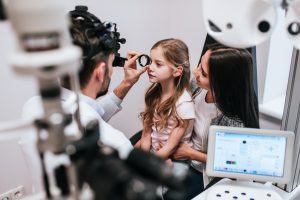It’s back-to-school time! As your child prepares to start another school year, don’t forget to take care of one of their most important learning tools — their eyes. Find out how you can help keep their eyes healthy, and why an eye exam is so important.
Be aware of vision problems:
Your kid may be spending more time in front of the screen than usual — and that could put him or her at increased risk for certain vision problems or eye conditions.
- Nearsightedness: If your child is not already nearsighted, doing a lot of “close work” (using a screen or even in a book) can increase their likelihood of developing this condition. Encourage them to hold books or screens at least 18 inches away.
- Dry Eye Syndrome: When we stare at a screen all day, our blink rate decreases significantly. The blinking action secretes an oil called meibum (one of the three layers of tear film), which keeps our eyes moist. When we don’t blink as much, our eyes can become overly dry and irritated.
- Eye Strain and Fatigue: Excessive screen time can also lead to strain, fatigue, blurry vision, itchy eyes, and headaches.
Watch for behavioral changes that may signal vision trouble, for example:
- Talk to your child about their new classroom or where they’re sitting to gauge whether they’re having issues seeing.
- Ask them whether their eyes ever feel tired after watching something on a screen.
- Watch for blinking, squinting and tearing of their eyes.
- Pay attention to headaches or fatigue.
Help minimize any risk to your child’s eyes by doing the following:
 Make sure they take frequent screen breaks. Instead of focusing directly on the screen, encourage your child to look around the room every now and then, or take some time to stare out the window (at least 20 seconds is recommended by the American Optometric Association). You can even remind them to blink.
Make sure they take frequent screen breaks. Instead of focusing directly on the screen, encourage your child to look around the room every now and then, or take some time to stare out the window (at least 20 seconds is recommended by the American Optometric Association). You can even remind them to blink.- Position the monitor or screen so it’s about 25 inches away, and also position it so their gaze is slightly downward.
- Adjust the room lighting so that the screen isn’t brighter than the surrounding light. If it is, your child’s eyes will have to work harder.
- Sharpen your child’s vision skills with “traditional” non-screen-based activities, like puzzles, blocks, drawing and painting, and playing catch.
Don’t Forget the Eye Exam
 It’s easy for us to forget about our eyes let alone our child’s, but it is very important to get your child’s eyes checked regularly.
It’s easy for us to forget about our eyes let alone our child’s, but it is very important to get your child’s eyes checked regularly.
It is absolutely critical to ensure healthy eye development and that they have the visual skills necessary for successful learning. No matter where your child will be participating in school this year — don’t skip the trip to the eye doctor.
The American Optometric Association recommends children have an eye exam by the time they reach one year old, at least once between 3 and 5 years old, and once a year after first grade until they graduate. Your eye doctor can recommend the best frequency for your child.
Your child should still receive a comprehensive eye exam, whether or not they have received a vision screening at school or even at their pediatrician’s office. While vision screenings can indicate some vision trouble, they often only test your child’s ability to see things that are far away, such as a classroom whiteboard. Also, keep in mind the school screeners usually do not have all the necessary equipment or training to detect many eye health problems in children.
A comprehensive eye examination looks at complete eye health, and includes tests for the following, in addition to an understanding of patient and family health history:
- Visual acuity
- Depth perception
- Color vision
- Peripheral vision
- Refractive errors (like nearsightedness, farsightedness and astigmatism)
- Eye focusing, tracking, teaming and other eye movement abilities
Specialists state that 80% of what your children learn in school is taught visually. Untreated vision troubles can put children at a substantial disadvantage. Be certain to arrange that your child has a complete eye exam before school starts.

